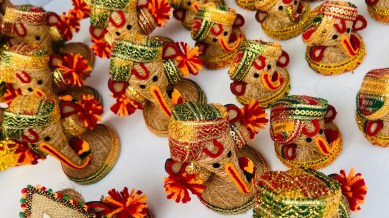📣 For more lifestyle news, click here to join our WhatsApp Channel and also follow us on Instagram
Echoes of forest and indigenous entrepreneurship at Aadi Mahotsav 2025: Celebrating craft, culture, and heritage
Festivals like Aadi Mahotsav foster cultural exchange and sustainable development, aligning with SDG 17 by promoting craft-based entrepreneurship, ecological balance, and women empowerment, in addition to other SDGs focused on sustainability, economic empowerment, culture, and ecology

The third edition of Aadi Mahotsav 2025, the flagship initiative of the Tribal Co-operative Marketing Development Federation of India Limited (TRIFED), was held from February 16 to 24 at Delhi’s Major Dhyan Chand National Stadium. With the theme “A Celebration of the Spirit of Tribal Crafts, Culture, Cuisine, and Commerce,” the festival celebrated and encouraged rural and forest-based entrepreneurship and the cultural capital tribal communities tirelessly preserve and conserve.
Over 600 tribal artisans showcased their craftsmanship at this annual cultural and commercial spectacle, which attracts thousands of visitors every year. Held alongside major festivals like Saras Aajeevika Mela and Surajkund Crafts Mela, the event reinforces Delhi-NCR’s status as a hub for art and heritage fairs.
monthly limit of free stories.
with an Express account.
The festival supports rural and forest livelihoods and the socio-economic empowerment of tribal artisans through economic empowerment programmes of Aajeevika and PM Van Dhan Vikas Yojana. Artisans displayed organic produce, handlooms, jewellery, paintings, and eco-friendly handicrafts, with international participation from Indonesia and Sri Lanka, making this year’s edition global.
Here’s a look at some of the unique crafts and organic produce featured at Aadi Mahotsav 2025:
Mahua products by Shabari Naturals, Maharashtra
The use of Mahua flowers, seeds, and fruits have been in conversation for some time now. While Mahua laddoos have been popular in Chhattisgarh, Mahua-based creams, oils, snacks, and soaps are new additions. In the first edition of the Aadi Mahotsav, there were Mahua biscuits that farmers from Vidarbha had made––processed, and packaged with the help of the PM Van Dhan Vikas Yojana.
Shabari Naturals, a Maharashtra government initiative, showcased Manmohak Mahua soaps, Mogi Bhog or Mahua laddoos oils, and body butters, beautifully packaged with Gond art. The packaging of each produce is eco-friendly, beautiful, unique and displays day-to-day living of tribal communities, for instance, collection of Mahua flowers by women. Such efforts not only address challenges in product packaging and marketing but also inform an urban audience of deep-rooted ecological traditions and importance of sustainable rural livelihoods. This enterprise not only markets Mahua-based products but also trains small farmers and businesses in herbal product processing.
Ganesha idols made of coir, Gujarat
Beenaben R Tadvi, 40, has been making Ganesha idols for four years in her home-based enterprise based in Gujarat’s Narmada district. A competitive exam aspirant once, she wanted to work in the government machinery. However, during COVID-19 pandemic, after attending a training programme organised by the Gujarat Matikam Kalakari & Rural Technology Institute she decided to become a full-time entrepreneur using the skills of coir and sequins craft making. With her family members and other women in her village, Tadvi makes beautiful and unique eco-friendly Ganesha idols, jewellery, and other small handicrafts.
Nannari Sharbat and Araku Coffee, Andhra Pradesh
A traditional summer cooler, Nannari sharbat from Nellore, made with ginger, cardamom, and Nannari roots, was showcased as a PM Van Dhan Vikas Yojana-supported venture. Nannari is a medicinal herb and has various therapeutic properties.
Meanwhile, Araku Coffee from the Paderu region and Araku Valley, with its Geographical Indication (GI) tag, that has consistently been promoted under One District, One Product (ODOP) scheme of the Government of India, was also available at the fair. Sourced from tribal communities in Visakhapatnam, this aromatic coffee is gaining recognition, competing with international brands while supporting small businesses and indigenous artisans.
Dhan crafts, Odisha
Paddy art is practiced by the Munda tribe of Odisha. The tribe engages in crafting jewellery and idols from rice husk. Pedhikara from Dhanayamajhi self help group (SHG), Nabarangpur, exhibited intricately woven earrings and handicrafts made from unhusked rice grains.
Chilli wild apple candies, Nagaland
The Khonoma Basa VDVK group from Nagaland presented wild apple, ginger, gooseberry, and plum candies. The spicy wild apple candies, dried and coated with chilli powder, are produced with support from PM Van Dhan Vikas Yojana, preserving forest-based livelihoods. Indigenous communities from the northeastern states harvest and process wild apples between September and November, creating products rich in flavour and nutrition.
Visitors explored a diverse range of indigenous products, including:
– Fruit wines from Nagaland.
– Harra and Baheda herbal powders from Madhya Pradesh.
– Embroidered necklaces from Arunachal Pradesh.
– Mekhela Chador, Jaapi jewellery, and Joha rice from Assam.
– Sikkim’s handmade soaps and skincare products
– Millet-based snacks and Mahua laddoos from Chhattisgarh and Maharashtra
– Traditional paintings like Sohrai, Khovar, Gond, and Pattachitra from Jharkhand, Madhya Pradesh, and Odisha.
-Ghee, and honey from the forests of Gir, Gujarat.
– Organic roselle flowers, sea buckthorn creams and oils, apricot scrubs and face pack powders, saffron
-Sabai, Moonj, Sikki grass crafts
Aadi Vyanjan: Celebrating tribal cuisine
Like previous years, the Aadi Vyanjan food section at the Mahotsav brought together diverse Indigenous cuisines, offering special thalis, meat, fish, rice preparations, Mahua tea, herbal beverages, and traditional delicacies. This thoroughly represented the food map of India under one roof.
A platform for sustainable growth
Festivals like Aadi Mahotsav foster cultural exchange and sustainable development, aligning with SDG 17 by promoting craft-based entrepreneurship, ecological balance, and women empowerment, in addition to other SDGs focused on sustainability, economic empowerment, culture, and ecology. Expanding global participation—like it is seen at the Surajkund Crafts Mela—could further strengthen its impact, making it a premier platform for tribal artisans worldwide.
📣 For more lifestyle news, click here to join our WhatsApp Channel and also follow us on Instagram